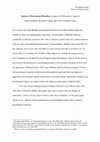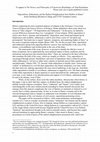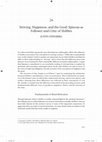Papers by Justin Steinberg
Journal of Spinoza Studies, Dec 22, 2022

Philosophers' Imprint
While psychological egoism is held in philosophical disrepute these days, most Anglophone Spinoza... more While psychological egoism is held in philosophical disrepute these days, most Anglophone Spinoza scholars confidently ascribe this position to him. Perhaps the most prominent alternative ascribes to Spinoza a hedonistic theory of motivation, which, while more plausible as an interpretation, faces many of the same philosophical problems. In this paper I argue that, fortunately, there is a better interpretation of Spinoza’s theory of motivation that avoids saddling him with a philosophically implausible position. Spinoza is neither a psychological egoist nor a psychological hedonist, but is rather a thoroughgoing motivational pluralist, or one who thinks that we can intrinsically desire a disparate range of objects that do not fall under any single guise. But while he is a motivational pluralist, he is also in some (non-psychological) sense an egoist and a hedonist. By examining how Spinoza’s psychological pluralism coheres with his non-psychological egoism and hedonism, we can appreciate the explanatory power of his theory of motivation, showing how he preserves the possibility of universal intelligibility without claiming that we always act under a single invariant guise.

Ergo an Open Access Journal of Philosophy
In the Ethics, Spinoza advances two apparently irreconcilable construals of will [voluntas]. Init... more In the Ethics, Spinoza advances two apparently irreconcilable construals of will [voluntas]. Initially, he presents will as a shorthand way of referring to the volitions that all ideas involve, namely affirmations and negations. But just a few propositions later, he defines it as striving when it is “related only to the mind” (3p9s). It is difficult to see how these two construals can be reconciled, since to affirm or assent to some content is to adopt an attitude with a cognitive (mind-to-world) direction of fit, while to strive to persevere in one’s being would seem to be to adopt an attitude with a conative (world-to-mind) direction of fit. Attempting to achieve consistency by taking striving under the attribute of thought to consist in affirming only pushes the equivocation problem onto the concept of affirmation (Lin 2019). It would seem, then, that Spinoza equivocates on the concepts of will, affirmation, or perhaps both. I defend the univocity of Spinoza’s accounts of will an...

Ergo, 2023
In the Ethics, Spinoza advances two apparently irreconcilable construals of will [voluntas]. Init... more In the Ethics, Spinoza advances two apparently irreconcilable construals of will [voluntas]. Initially, he presents will as a shorthand way of referring to the volitions that all ideas involve, namely affirmations and negations. But just a few propositions later, he defines it as striving when it is "related only to the mind" (3p9s). It is difficult to see how these two construals can be reconciled, since to affirm or assent to some content is to adopt an attitude with a cognitive (mind-to-world) direction of fit, while to strive to persevere in one's being would seem to be to adopt an attitude with a conative (world-to-mind) direction of fit. Attempting to achieve consistency by taking striving under the attribute of thought to consist in affirming only pushes the equivocation problem onto the concept of affirmation (Lin 2019). It would seem, then, that Spinoza equivocates on the concepts of will, affirmation, or perhaps both. I defend the univocity of Spinoza's accounts of will and affirmation, showing that it comports with established accounts of affirmation in early modern philosophy and yields a clear, uniform account of what it means to strive under the attribute of thought, preserving the systematicity of Spinoza's account of mind in ways that other interpretations do not.

The History and Philosophy of Fanaticism, ed. Paul Katsafanas (Routledge), 2023
Many contemporary accounts of fanaticism present the fanatic as intolerant (Passmore 2003, Katsaf... more Many contemporary accounts of fanaticism present the fanatic as intolerant (Passmore 2003, Katsafanas 2019) or fundamentally hostile to civil society (Colas 1997). In this chapter, I push back against this understanding by examining the status of the “fanatic” or “enthusiast” (these terms were used interchangeably) in the early modern period, as viewed from the perspective of the radical enlightenment. According to this tradition, it was not the putatively divinely-inspired enthusiasts or fanatics who were the disturbers of the peace; it was their sworn enemies: the superstitious clergy. In the Anglo-Dutch context, “fanatics” found common ground with the likes of Hobbes and Spinoza, who sought to eliminate forms of authority, spiritual or secular, that might compete with the authority of the civil sovereign. And they advanced principled arguments in defense of religious toleration, revealing themselves to be, as Hume later puts it, friends to civil liberty. I conclude by arguing that we should either revise our understanding of fanaticism or deny that “fanaticism” is a stable (transhistorical) concept and so cede the analysis of fanaticism to the social sciences.
Humility: A History (Oxford Philosophical Concepts), ed. Justin Steinberg (Oxford), 2024
The Bloomsbury Companion to Spinoza, second edition, eds. Wiep van Bunge, Henri Krop, Piet Steenbakkers, and Jeroen van de Ven (Bloombury), 2023
Journal of Spinoza Studies, 2022
In this paper I maintain that Spinoza systematizes independently credible accounts of belief-form... more In this paper I maintain that Spinoza systematizes independently credible accounts of belief-formation, affect, and desire into an intriguing general theory of how the mind works. His account also explains disparate downstream psychological phenomena, including: (1) emotional responses to fiction; (2) belief perseverance; (3) the reduction of cognitive dissonance; (4) epistemic conservativism that opens us up to confirmation bias, identity protection, and intolerance. Given the promise of Spinoza’s program, I conclude with a plea for further philosophical engagement.
The Palgrave Handbook of Toleration, ed. Mitja Sardo
This chapter considers the challenges to, and the resources for, cultivating a personal capacity ... more This chapter considers the challenges to, and the resources for, cultivating a personal capacity for tolerance, according to the writings of Benedict Spinoza (1632-1677). After articulating two main components of personal tolerance, I examine the features of Spinoza's theory of cognition that make the cultivation of tolerance so difficult. This is followed by an analysis of Spinoza's account of overcoming intolerant tendencies. Ultimately, I argue that the capacity of individuals to be tolerant depends crucially on the establishment of conditions of trust, conditions that are conspicuously lacking in many modern democracies.

Blackwell Companion to Hobbes, ed. Marcus Adams
It is often noted that among the ways that Spinoza's philosophy reflects the influence of Hobbes ... more It is often noted that among the ways that Spinoza's philosophy reflects the influence of Hobbes is in terms of his conception of striving (conatus). 1 While this is undoubtedly true, in this chapter I wish to analyze one important way in which Hobbes and Spinoza differ in their understanding of "striving" and to show that this difference goes some distance in accounting for their remarkably different normative philosophies. I argue that Spinoza's commitment to an essentialist reading of striving helps to explain his profound, and somewhat underappreciated, break with Hobbes not only in terms of his views of right and obligation, but also in terms of his conceptions of happiness and the good. The structure of this chapter is as follows: I open by examining the similarities between Hobbes's and Spinoza's views on motivation. This is followed by an analysis of the distinct ways in which they understand striving, and in turn agency and artifice, showing how these differences are reflected in their conceptions of civil life. Finally, I consider how the differences described in the preceding sections yield fundamentally different views of goodness, happiness, liberty, and the function of the state.
Contemporary Political Theory , 2020

Ethics and Education , 2020
In this paper, I argue that Spinoza’s political theory gives us a model for how he might have app... more In this paper, I argue that Spinoza’s political theory gives us a model for how he might have approached a treatise on moral education. Indeed, his account of the method and aims of politics resembles Renaissance humanist rhetorical approaches to pedagogy – particularly, the work of sixteenth century Spanish humanist Juan Luis Vives – so strongly that it is hardly an exaggeration conclude that, for him, politics is education writ large. For Spinoza and for Vives, the governor- or-instructor must study the prevailing character, or inge- nium, of the subject and adopt means that promote the cognitive and emotional development of the subject, which can be accomplished only to the extent that subjects will- ingly participate in their own governance-or-instruction. Spinoza joins this rhetorical procedure to a Hobbesian scien- tific approach to studying ingenia, resulting in a political method that is part science, part art.

Spinoza’s Political Treatise: A Critical Guide, eds. Hasana Sharp and Yitzhak Melamed, 2018
Spinoza’s treatment of absolute sovereignty raises a number of interpretative questions. He seems... more Spinoza’s treatment of absolute sovereignty raises a number of interpretative questions. He seems to embrace a form of absolutism that is incompatible with his defense of mixed government and constitutional limits on sovereign power. And he seems to use the concept of “absolute sovereignty” in inconsistent ways. I offer an interpretation of Spinoza’s conception of absolutism that aims to resolve these problems. I argue that Spinoza is able to show that, when tied to a proper understanding of authority, absolute sovereignty is not only compatible with, but actually necessitates, power-sharing and constitutionalism. His treatment of “absolute sovereignty” in the political works is akin to his treatment of “substance” and “God” in the Ethics: he draws out revisionist implications from a recognizable, even anodyne, conceptual gloss, transfiguring the concept from within a common framework. This interpretation renders intelligible and consistent the various claims that Spinoza makes about sovereign absolutism in the Political Treatise.
European Journal of Philosophy, 2018
Spinoza's account of belief entails that if A has two ideas, p and q, with incompatible content, ... more Spinoza's account of belief entails that if A has two ideas, p and q, with incompatible content, A believes that p (and not that q) if the idea of p is stronger than the idea of q. This seems to leave little space for dominant non-beliefs, or cases in which there is discord between one’s beliefs and one’s affective-behavioral responses. And yet Spinoza does allow for two classes of dominant non-beliefs: efficacious fictions [fictiones] and ideas that conduce to akrasia. I show how Spinoza can account for dominant non-beliefs within his model of cognition by distinguishing between the doxastic and the affective powers of ideas and by suggesting that doxastic power is best understood diachronically. While other scholars have stressed the elegance of Spinoza’s account of ideas, this paper highlights the sophistication and flexibility of his account.

Two priority problems frustrate our understanding of Spinoza on desire [cupiditas]. The first pro... more Two priority problems frustrate our understanding of Spinoza on desire [cupiditas]. The first problem concerns the relationship between desire and the other two primary affects, joy [laetitia] and sadness [tristitia]. Desire seems to be the oddball of this troika, not only because, contrary to the very definition of an affect (3d3; 3 General Definition of the Affects), desires do not themselves consist in changes in one's power of acting, but also because desire seems at once more and less basic than joy and sadness. The second problem concerns the priority of desires and evaluative judgements. While 3p9s and 3p39s suggest that evaluative judgements are (necessarily) posterior to desires, Andrew Youpa has recently argued that passages in Ethics 4 indicate that rational evaluative judgements can give rise to, rather than arise out of, desires. I aim to offer solutions to these problems that reveal the elegance and coherence of Spinoza's account of motivation. Ultimately, I argue that whereas emotions and desires stand in a non-reductive, symmetrical relationship to one another, evaluative judgements must be understood as asymmetrically dependent on, and reducible to, emotions or desires. This interpretation sheds light on our understanding of Spinoza's cognitivist account of emotion. For Spinoza, while emotions are representational, they are not underpinned by evaluative judgements. Rather than inflating emotions to include evaluative judgements, he deflates evaluative judgements, treating them as emotions, or valenced representations, and nothing more.











Uploads
Papers by Justin Steinberg